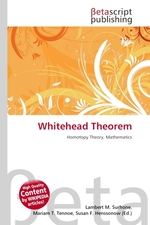Whitehead Theorem
Lambert M. Surhone, Miriam T. Timpledon, Susan F. Marseken
бумажная книга
High Quality Content by WIKIPEDIA articles! In homotopy theory (a branch of mathematics), the Whitehead theorem states that if a continuous mapping f between topological spaces X and Y induces isomorphisms on all homotopy groups, then f is a homotopy equivalence provided X and Y are connected and have the homotopy-type of CW complexes. This result was proved by J. H. C. Whitehead in two landmark papers from 1949, and provides a justification for working with the CW complex concept that he introduced there. More accurately, we suppose given CW complexes X and Y, with respective base points x and y. Given a continuous mapping fcolon X to Y such that f(x) = y, we consider for n ? 0 the induced homomorphisms f_*colon pi_n(X,x) to pi_n(Y,y), where ?n denotes for n ? 1 the n-th homotopy group. For n = 0 this means the mapping of the path-connected components; if we assume both X and Y are connected we can ignore this as containing no information. We say that f is a weak homotopy equivalence if the homomorphisms f* are all bijective. The Whitehead theorem then states that a weak homotopy equivalence, for connected CW complexes, is a homotopy equivalence.
Данное издание не является оригинальным. Книга печатается по технологии принт-он-деманд после получения заказа.


